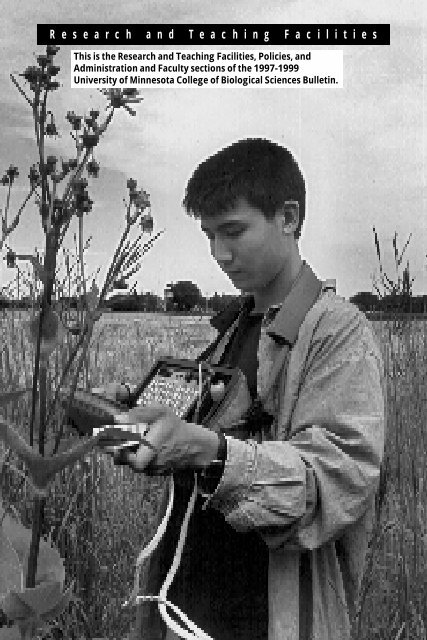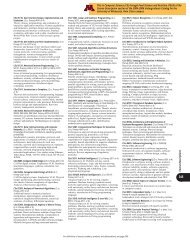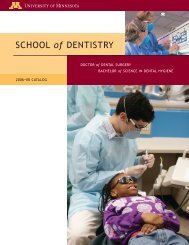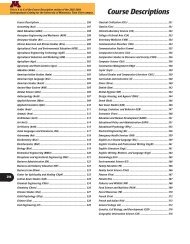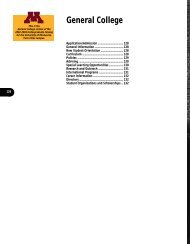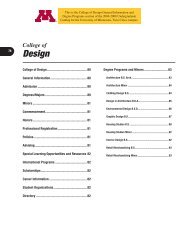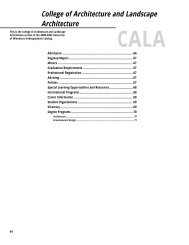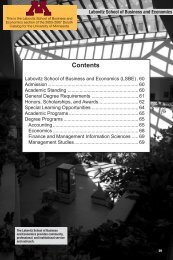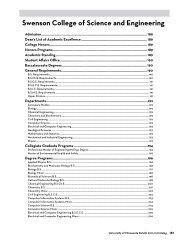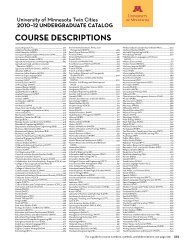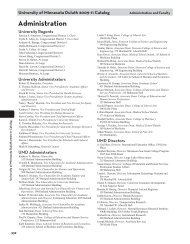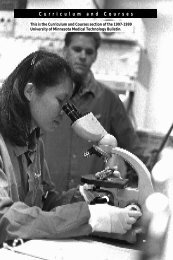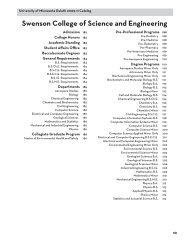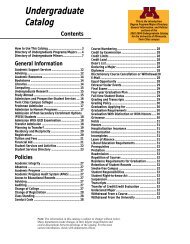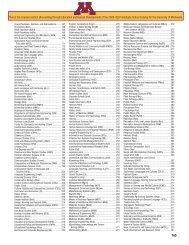R e s e a r c h a n d T e a c h i n g F a c i l i t i e s - University Catalogs
R e s e a r c h a n d T e a c h i n g F a c i l i t i e s - University Catalogs
R e s e a r c h a n d T e a c h i n g F a c i l i t i e s - University Catalogs
Create successful ePaper yourself
Turn your PDF publications into a flip-book with our unique Google optimized e-Paper software.
RESEARCH AND TEACHING FACILITIES<br />
R e s e a r c h a n d T e a c h i n g F a c i l i t i e s<br />
This is the Research and Teaching Facilities, Policies, and<br />
Administration and Faculty sections of the 1997-1999<br />
<strong>University</strong> of Minnesota College of Biological Sciences Bulletin.<br />
48
Research and<br />
Teaching Facilities<br />
CBS has faculty and facilities on both the<br />
Minneapolis and St. Paul campuses. The<br />
college is organized into the following<br />
departments: biochemistry; ecology, evolution,<br />
and behavior; genetics and cell biology; and<br />
plant biology. The Department of Microbiology<br />
as well as the neuroscience program, both of<br />
which are housed in the Medical School, also<br />
function as CBS departments for undergraduate<br />
education. A full description of all these<br />
departments and their major degree<br />
requirements may be found in Major<br />
Requirements and Course Descriptions.<br />
In addition, CBS is responsible for the<br />
administration of several instructional<br />
programs, research institutes, shared-use<br />
laboratories, and an active field biology<br />
program, with facilities at several locations<br />
around the state (see below). A complete list of<br />
faculty is provided in Administration and<br />
Faculty.<br />
Special Research and<br />
Teaching Centers<br />
The Albert Frenkel Reading Room—Located<br />
on the fourth floor of the Biological Sciences<br />
Center on the St. Paul campus, the reading<br />
room supports courses and research in CBS.<br />
Current journals in many areas of biology are<br />
available for use in the room (612/624-7752).<br />
Biological Sciences Greenhouse—Located on<br />
the St. Paul campus, the greenhouse is a<br />
teaching and research facility with standard<br />
bench space. Three landscaped rooms exhibit<br />
the flora of the tropics, subtropics, and desert<br />
(612/625-4788).<br />
Herbarium—The Herbarium contains more<br />
than 820,000 specimens of fungi, lichens,<br />
mosses, gymnosperms, and angiosperms<br />
collected mainly on the North American<br />
continent. This collection (sixth largest among<br />
university herbaria) is a major resource for<br />
botanically oriented research both at the<br />
<strong>University</strong> and at other institutions. It also plays<br />
an important role of outreach to the public,<br />
offering assistance with identification of and<br />
information about plants (612/625-0215).<br />
Cedar Creek Natural History Area—Located<br />
within commuting distance of campus, Cedar<br />
Creek not only serves as the site of ecological<br />
and behavioral field research, but also provides<br />
unique opportunities for student projects and<br />
summer employment. For student<br />
opportunities, contact the Office of Student<br />
Services (612/624-9717) or the Program<br />
Director of Cedar Creek Natural History Area<br />
(612/625-5740).<br />
Developmental Biology Center—The<br />
<strong>University</strong> has launched a major initiative in<br />
developmental biology, with researchers<br />
representing both the basic and the clinical<br />
sciences. Developmental biology identifies<br />
mechanisms whereby a single cell, the fertilized<br />
egg, develops into a complex multicellular<br />
organism containing millions of cells organized<br />
into characteristic patterns, with many different<br />
specialized functions. Developmental biology<br />
has become a central subject in biology and is<br />
of both medical and economic importance. The<br />
center serves as a resource for collaborative<br />
research and training (612/624-3110).<br />
General Biology Program—Located in P180<br />
Kolthoff Hall on the Minneapolis campus, the<br />
General Biology Program administers<br />
beginning biology courses for most <strong>University</strong><br />
students, serving approximately 3,200 students<br />
per year. The college takes its responsibility for<br />
introductory instruction in biology very<br />
seriously; students will meet CBS’s finest<br />
instructors in these courses and enjoy personal<br />
attention in laboratory sections. For more<br />
information, call (612) 625-6636 .<br />
Imaging Center—Located in 23 Snyder Hall,<br />
the center is a self-service facility open to<br />
<strong>University</strong> students, staff, and faculty and to<br />
investigators outside the <strong>University</strong> in support<br />
of their teaching and research activities. The<br />
Imaging Center specializes in light and electron<br />
optical methods, with the expertise centered on<br />
immunofluorescense and confocal imaging.<br />
Training and technical help are provided to<br />
meet imaging needs. (612/624-3454).<br />
Biological Process Technology Institute<br />
(BPTI)—The institute, established in 1985,<br />
takes advantage of the unusual breadth of<br />
interest and expertise of faculty at the<br />
<strong>University</strong> to investigate cell population<br />
49
RESEARCH AND TEACHING FACILITIES<br />
biology, membrane biology, molecular<br />
genetics, and protein structure and function as<br />
they relate to biological process technology.<br />
The BPTI Bioprocessing Pilot Facility is a<br />
shared-use facility, a <strong>University</strong>-wide<br />
laboratory equipped with state-of-the-art<br />
equipment to facilitate research in fermentation,<br />
animal and plant cell culture technology, and<br />
large-scale separation of biological molecules.<br />
BPTI promotes collaboration between<br />
<strong>University</strong> researchers and industry, meeting<br />
increasing demands for students trained jointly<br />
in biological and engineering disciplines (612/<br />
624-6774).<br />
Institute of Human Genetics—The institute’s<br />
major objective is to develop an<br />
interdisciplinary approach to the study and<br />
application of new developments in human<br />
genetics. It develops technologies necessary for<br />
understanding the structure, function, and<br />
expression of human chromosomes and genes<br />
for the prevention, diagnosis, and therapy of<br />
inborn and acquired genetic disorders. The<br />
institute’s genetic programs include genetic<br />
services (Molecular Diagnostics Laboratory,<br />
microchemical facility, gene therapy program);<br />
molecular, behavioral, clinical, and population<br />
genetics; and the Genetic Counseling Program;<br />
(612/624-3110).<br />
Lake Itasca Forestry and Biological<br />
Station—Located at the headwaters of the<br />
Mississippi River in northern Minnesota, the<br />
field station is in an unparalleled ecological<br />
area where three great plant regions of the<br />
United States meet. These 50 square miles of<br />
protected forest provide unique opportunities<br />
for the study of varied ecosystems and of fauna<br />
and flora with southern, northern, and western<br />
origins. Diverse lakes and wetlands provide<br />
unusual field advantages for aquatic studies.<br />
Information about the highly popular summer<br />
biology offerings is in the Summer Session<br />
Bulletin. Reservations for and questions about<br />
the Itasca program should be addressed to the<br />
Director, Itasca Biology Program, <strong>University</strong> of<br />
Minnesota, 303 Ecology Building, 1987 Upper<br />
Buford Circle, St. Paul MN 55108 (612/624-<br />
6743).<br />
Instructional Computing Center—Biology<br />
students have access to a well-equipped<br />
Macintosh computing facility in 406 Biological<br />
Sciences Center and a Windows facility in 170<br />
Ecology Building. Priority in the computer<br />
center is given to undergraduates working on<br />
course-related materials. Students can use<br />
programs for word processing, graphing,<br />
drawing, or spreadsheets. Students can also<br />
access many electronic databases and file<br />
servers around the world, as well as their own<br />
electronic mail service. The center houses<br />
specialized software, such as programs to help<br />
students prepare for the Graduate Record<br />
Examination (GRE). Hours for each computing<br />
lab are posted on the lab doors.<br />
Advanced Bioscience Computing Center<br />
(ABCC)—Located in 247 Gortner Laboratory,<br />
the center serves more than 110 labs with<br />
advanced nucleic acid and peptide sequence<br />
analysis software. Molecular graphics facilities<br />
permit specialized research on the structure and<br />
function of DNA, RNA, and proteins. Student<br />
computers are available, as are workshops, a<br />
help line, and consulting. For more information,<br />
call (612) 625-9284.<br />
Plant Molecular Genetics Institute—The<br />
institute fosters research in molecular biology<br />
and genetics of economically important plants<br />
and relevant model plant systems, develops<br />
genetic engineering methodologies for<br />
application to crop improvement, educates<br />
future plant biology researchers and teachers,<br />
maintains an interdisciplinary environment in<br />
which to explore and develop new ideas and<br />
experimental approaches in plant molecular<br />
biology, and provides a focus for external<br />
communication to aid recruitment and funding.<br />
Institute faculty come from two colleges<br />
(Biological Sciences and Agricultural, Food,<br />
and Environmental Sciences) and six<br />
departments (agronomy and plant genetics,<br />
biochemistry, genetics and cell biology,<br />
horticultural science, plant biology, and plant<br />
pathology). The institute supports seminars and<br />
symposia on topics related to plant molecular<br />
biology and provides funds for speakers and<br />
visiting scientists (612/625-3129).<br />
50
Graduate Programs<br />
Graduate study at the <strong>University</strong> is coordinated<br />
and administered by the Graduate School. For<br />
details about general policies regarding<br />
admission requirements, registration<br />
procedures, financial aid, and requirements for<br />
graduate degrees, refer to the Graduate School<br />
Bulletin. Application materials may be obtained<br />
from CBS department offices.<br />
Questions regarding specific bioscience<br />
programs should be addressed to the director of<br />
graduate studies in the appropriate program<br />
area.<br />
Biochemistry, Molecular Biology, and<br />
Biophysics—John S. Anderson, 624-3662<br />
Conservation Biology—<br />
Donald B. Siniff, 624-6743<br />
Ecology—Edward J. Cushing, 625-5713<br />
Genetic Counseling—Bonnie Leroy, 624-7193<br />
Microbial Engineering—<br />
Friedrich Srienc, 624-9776<br />
Microbiology, Immunology, and Molecular<br />
Pathobiology—Marc K. Jenkins, 626-2715<br />
Molecular, Cellular, Developmental Biology,<br />
and Genetics—Robert J. Brooker, 624-3053<br />
Neuroscience—Robert F. Miller, 626-2914<br />
Plant Biological Sciences—<br />
Alan Smith, 624-9290<br />
Zoology—Elmer C. Birney, 624-6770<br />
51
POLICIES P o l i c/ iADMINISTRATION e s / A d m iAND n i sFACULTY<br />
t r a t i o n a n d F a c u l t y<br />
52
lnformation Resources<br />
Bulletin Use—The <strong>University</strong> of Minnesota will<br />
change to a semester-based academic calendar<br />
beginning academic year 1999-2000. This<br />
bulletin is the last quarter-based bulletin that will<br />
be produced for the College of Biological<br />
Sciences. It covers academic years 1997-98 and<br />
1998-99. Information about semester-based<br />
academic programs will be provided in the fall<br />
of 1998 in semester-transition publications.<br />
The information in this bulletin and other<br />
<strong>University</strong> bulletins, publications, or<br />
announcements is subject to change without<br />
notice. <strong>University</strong> offices can provide current<br />
information about possible changes.<br />
This publication is available in alternative<br />
formats upon request. Please contact the Office<br />
of Admissions, <strong>University</strong> of Minnesota, 240<br />
Williamson Hall, 231 Pillsbury Drive S.E.,<br />
Minneapolis, MN 55455 (612/625-2008; e-mail<br />
admissions@tc.umn.edu).<br />
This bulletin also is available in electronic<br />
format on the Internet and may be accessed at<br />
http://www.umn.edu/commpub on the World<br />
Wide Web.<br />
Class Schedule—The Class Schedule,<br />
distributed with registration materials each<br />
quarter, lists current course offerings scheduled<br />
for the term, including class hours, rooms, and<br />
instructors. It also includes registration<br />
instructions and final exam schedules.<br />
Information about evening courses and summer<br />
school offerings is in the <strong>University</strong> College<br />
Evening Classes Bulletin and Summer Session<br />
Bulletin, respectively.<br />
CBS policies, and other information of<br />
interest to enrolled students, may be found in<br />
the CBS Student Handbook.<br />
Course Guide—The Course Guide, a quarterly<br />
publication distributed at the <strong>University</strong><br />
Bookstores, provides course information in<br />
addition to college bulletins and the Class<br />
Schedule.<br />
For More Information—Contact the Director of<br />
Student Services, College of Biological Sciences,<br />
223 Snyder Hall, <strong>University</strong> of Minnesota, 1475<br />
Gortner Avenue, St. Paul, MN 55108 (612/624-<br />
9717). Visit the CBS Web site at http://<br />
biosci.cbs.umn.edu/admin/student_services/<br />
Policies<br />
Equal Opportunity—The <strong>University</strong> of<br />
Minnesota is committed to the policy that all<br />
persons shall have equal access to its programs,<br />
facilities, and employment without regard to<br />
race, color, creed, religion, national origin, sex,<br />
age, marital status, disability, public assistance<br />
status, veteran status, or sexual orientation.<br />
In adhering to this policy, the <strong>University</strong><br />
abides by the Minnesota Human Rights Act,<br />
Minnesota Statute Ch. 363; by the Federal Civil<br />
Rights Act, 42 U.S.C. 2000e; by the<br />
requirements of Title IX of the Education<br />
Amendments of 1972; by Sections 503 and 504<br />
of the Rehabilitation Act of 1973; by the<br />
Americans With Disabilities Act of 1990; by<br />
Executive Order 11246, as amended; by 38<br />
U.S.C. 2012, the Vietnam Era Veterans<br />
Readjustment Assistance Act of 1972, as<br />
amended; and by other applicable statutes and<br />
regulations relating to equality of opportunity.<br />
Inquiries regarding compliance may be<br />
directed to Stephanie Lieberman, Director,<br />
Office of Equal Opportunity and Affirmative<br />
Action, <strong>University</strong> of Minnesota, 419 Morrill<br />
Hall, 100 Church Street S.E., Minneapolis, MN<br />
55455 (612/624-9547).<br />
Access to Student Educational Records—In<br />
accordance with regents’ policy on access to<br />
student records, information about a student<br />
generally may not be released to a third party<br />
without the student’s permission. (Exceptions<br />
under the law include state and federal educational<br />
and financial aid institutions.) The policy also<br />
permits students to review their educational records<br />
and to challenge the contents of those records.<br />
Some student information—name, address,<br />
electronic (e-mail) address, telephone number,<br />
dates of enrollment and enrollment status (full<br />
time, part time, not enrolled, withdrawn and<br />
date of withdrawal), college and class, major,<br />
adviser, academic awards and honors received,<br />
and degrees earned—is considered public or<br />
directory information. Students may prevent the<br />
release of public information. To do so, they<br />
must notify the records office on their campus.<br />
Students have the right to review their<br />
educational records. The regents’ policy is<br />
available for review at 150 Williamson Hall,<br />
Minneapolis, and at records offices on other<br />
53
POLICIES / ADMINISTRATION AND FACULTY<br />
campuses of the <strong>University</strong>. Questions may be<br />
directed to the Office of the Registrar, 150<br />
Williamson Hall (612/625-5333).<br />
Immunization—Students born after 1956 who<br />
take more than one <strong>University</strong> class are<br />
required under Minnesota law to submit an<br />
Immunization Record form.<br />
The form, which is sent along with the<br />
official <strong>University</strong> admission letter, must be<br />
filled out and returned to Boynton Health<br />
Service within 45 days of the first term of<br />
enrollment in order for students to continue<br />
registering for classes at the <strong>University</strong>.<br />
Complete instructions accompany the form.<br />
Extracurricular Events—No extracurricular<br />
events requiring student participation may be<br />
scheduled from the beginning of study day to the<br />
end of finals week. Exceptions to this policy<br />
may be granted by the Senate Committee on<br />
Educational Policy. The Senate advises all<br />
faculty that any exemption granted pursuant to<br />
this policy shall be honored and that students<br />
who are unable to complete course requirements<br />
during finals week shall be provided an<br />
alternative and timely opportunity to do so.<br />
Smoke-Free Campus Policy—Smoking is<br />
prohibited in all facilities of the <strong>University</strong> of<br />
Minnesota, Twin Cities campus except for<br />
designated private residence hall rooms.<br />
Planning to Transfer?<br />
Minnesota’s public colleges and universities are<br />
working to make transfer easier. You can help<br />
if you PLAN AHEAD, ASK QUESTIONS, and<br />
USE PATHWAYS created by transfer<br />
agreements.<br />
Preparing for Transfer<br />
If you are currently enrolled in a college or<br />
university:<br />
• Discuss your plans with the campus transfer<br />
specialist in the Office of Student Services,<br />
223 Snyder Hall (612/624-9717).<br />
• Call or visit your intended transfer college.<br />
You should obtain the following materials<br />
and information:<br />
—college catalog<br />
—transfer brochure<br />
—information on admissions criteria and on<br />
materials required for admission (e.g.,<br />
portfolio, transcripts, test scores). Note that<br />
some majors have limited enrollments or<br />
their own special requirements such as a<br />
higher grade point average.<br />
—information on financial aid (how to<br />
apply and by what date)<br />
• After you have reviewed these materials,<br />
make an appointment to talk with an<br />
adviser/counselor in the college or program<br />
you want to enter. Be sure to ask about<br />
course transfer and admission criteria.<br />
If you are not currently enrolled in a college<br />
or university, you might begin by meeting with<br />
a transfer specialist or an admission officer at<br />
your intended transfer college to plan the steps<br />
you need to take.<br />
Understanding How<br />
Transfer of Credit Works<br />
• The receiving college or university decides<br />
what credits transfer and whether those<br />
credits meet its degree requirements. The<br />
accreditation of both your sending and your<br />
receiving institution can affect the transfer<br />
of the credits you earn.<br />
• Institutions accept credits from courses and<br />
programs like those they offer. They look<br />
for similarity in course goals, content, and<br />
level. “Like” transfers to “like.”<br />
• Not everything that transfers will help you<br />
graduate. Baccalaureate degree programs<br />
usually count credits in three categories:<br />
general education, major/minor courses and<br />
prerequisites, and electives. The key<br />
question is, “Will your credits fulfill<br />
requirements of the degree or program you<br />
choose?”<br />
• If you change your career goal or major, you<br />
might not be able to complete all degree<br />
requirements within the usual number of<br />
graduation credits.<br />
Applying for Transfer Admission<br />
• Application for admission is always the first<br />
step in transferring. Fill out the application<br />
as early as you can prior to the deadline.<br />
Enclose the application fee.<br />
54
• Request that official transcripts be sent from<br />
every institution you have attended. You<br />
might be required to provide a high school<br />
transcript or GED test scores as well.<br />
• Recheck to be certain you supplied the<br />
college or university with all the necessary<br />
paperwork. Most colleges make no decisions<br />
until all required documents are in your file.<br />
• If you have heard nothing from your intended<br />
college of transfer after one month, call to<br />
check on the status of your application.<br />
• After the college notifies you that you have<br />
been accepted for admission, your<br />
transcripted credits will be evaluated for<br />
transfer. A written evaluation should tell you<br />
which courses transfer and which do not.<br />
How your courses specifically meet degree<br />
requirements may not be decided until you<br />
arrive for orientation or have chosen a major.<br />
• If you have questions about your evaluation,<br />
call the Office of Admissions and ask to<br />
speak with a credit evaluator. Ask why<br />
judgments were made about specific<br />
courses. Many concerns can be cleared up if<br />
you understand why decisions were made. If<br />
not satisfied, you can appeal. See “Your<br />
Rights as a Transfer Student” below.<br />
Your Rights as a Transfer Student<br />
• A clear, understandable statement of an<br />
institution’s transfer policy.<br />
• A fair credit review and an explanation of<br />
why credits were or were not accepted.<br />
• A copy of the formal appeals process.<br />
Usual appeals steps are: 1) Student fills out<br />
an appeals form. Supplemental information<br />
you provide to reviewers—a syllabus,<br />
course description, or reading list—can<br />
help. 2) Department or committee will<br />
review. 3) Student receives, in writing, the<br />
outcome of the appeal. 4) Student can<br />
appeal decision to the Office of Student<br />
Services, 223 Snyder Hall (612/624-9717).<br />
• At your request, a review of your eligibility<br />
for financial aid or scholarships.<br />
For help with your transfer questions or<br />
problems, see your campus transfer specialist.<br />
55
POLICIES / ADMINISTRATION AND FACULTY<br />
<strong>University</strong> Regents<br />
William E. Hogan II, Minnetonka, Chair<br />
Patricia B. Spence, Rice, Vice Chair<br />
Robert S. Bergland, Roseau<br />
Julie A. Bleyhl, Madison<br />
Warren C. Larson, Bagley<br />
David R. Metzen, South St. Paul<br />
H. Bryan Neel III, Rochester<br />
Michael O’Keefe, Minneapolis<br />
William R. Peterson, Eagan<br />
Jessica J. Phillips, Morris<br />
Thomas R. Reagan, Gilbert<br />
Maureen K. Reed, Stillwater<br />
<strong>University</strong> Administrators<br />
Mark G. Yudof, President<br />
Robert Bruininks, Executive Vice President and Provost<br />
Frank B. Cerra, Senior Vice President for Health Sciences<br />
JoAnne G. Jackson, Senior Vice President for Finance and<br />
Operations<br />
McKinley Boston, Jr., Vice President for Student Development<br />
& Athletics<br />
Mark L. Brenner, Vice President for Research and Dean of the<br />
Graduate School<br />
Carol Carrier, Acting Vice President for Human Resources<br />
Michael Martin, Acting Vice President for Agricultural Policy<br />
Thomas H. Swain, Acting Vice President for Institutional<br />
Relations<br />
Mark B. Rotenberg, General Counsel<br />
College of Biological Sciences<br />
Administrators<br />
This is a listing of deans, department heads, and directors; see<br />
also CBS Directory in the introduction for special program<br />
offices and directors of undergraduate study. A listing of all CBS<br />
faculty follows.<br />
Robert P. Elde, dean<br />
123 Snyder Hall, St. Paul campus (612/624-2244)<br />
belde@biosci.cbs.umn.edu<br />
Kathryn Hanna, assistant dean<br />
123 Snyder Hall, St. Paul campus (612/624-2244)<br />
khanna@biosci.cbs.umn.edu<br />
Verna L. Holoman, coordinator of recruitment and retention for<br />
the life sciences<br />
123 Snyder Hall, St. Paul campus (612/625-8752)<br />
vholoman@biosci.cbs.umn.edu<br />
Kathleen F. Peterson, director of student services<br />
223 Snyder Hall, St. Paul campus (612/624-9717)<br />
kathiep@biosci.cbs.umn.edu<br />
Advanced Bioscience Computing Center—Dan Prestridge,<br />
director, 247 Gortner Laboratory, St. Paul campus (625-9284)<br />
danp@biosci.cbs.umn.edu<br />
Biochemistry—David Bernlohr, interim head, 140 Gortner<br />
Laboratory, St. Paul campus (624-7755)<br />
david-b@biosci.cbs.umn.edu<br />
Biological Process Technology Institute—Kenneth Valentas,<br />
director, 240 Gortner Laboratory, St. Paul campus (624-6774)<br />
valentas@biosci.cbs.umn.edu<br />
Cedar Creek—G. David Tilman, director, 509 Ecology Building,<br />
St. Paul campus (625-5743); Cedar Creek Area (434-5131)<br />
tilman@cdr.lter.umn.edu<br />
Developmental Biology Center—Chris Wylie, director, 4-122<br />
Malcolm Moos Health Sciences Tower, Minneapolis campus<br />
(624-3110)<br />
wylie@lenti.med.umn.edu<br />
Ecology, Evolution, and Behavior—Patrice Morrow, head, 100<br />
Ecology Building, St. Paul campus (625-5700)<br />
morrow@biosci.cbs.umn.edu<br />
General Biology Program—John Beatty, director, P180 Kolthoff<br />
Hall, Minneapolis campus (625-6636)<br />
jbeatty@tc.umn.edu<br />
Genetics and Cell Biology—Ross G. Johnson, head, 248A<br />
Biological Sciences Center, St. Paul campus (624-3003)<br />
gaplab@tc.umn.edu<br />
Herbarium—Anita Cholewa, curator and director, 842<br />
Biological Sciences Center, St. Paul Campus (625-0215)<br />
anita@mozart.cbs.umn.edu<br />
Imaging Center—Mark Sanders, director, 35 Snyder Hall, St.<br />
Paul campus (624-3454)<br />
msanders@biosci.cbs.umn.edu<br />
Information Technology—Michael Fernandez, coordinator, 122<br />
Snyder Hall, St. Paul campus (625-2273)<br />
m-fern@tc.umn.edu<br />
Lake Itasca Program—Donald Siniff, director, 303 Ecology<br />
Building, St. Paul campus (625-5732)<br />
siniff@biosci.cbs.umn.edu<br />
Microbiology (Medical School)—Ashley T. Haase, head, 1460<br />
Mayo Memorial Building, Minneapolis campus (624-4442)<br />
ashley@lenti.med.umn.edu<br />
Plant Biology—Stephen Gantt, interim head, 220 Biological<br />
Sciences Center, St. Paul campus (625-1234)<br />
steve@biosci.cbs.umn.edu<br />
Plant Molecular Genetics Institute—Neil E. Olszewski, director,<br />
220 Biological Sciences Center, St. Paul campus (625-3129)<br />
neil@biosci.cbs.umn.edu<br />
56
Faculty<br />
* Recipient of the Horace T. Morse-Minnesota Alumni<br />
Association Award for Outstanding Contributions to<br />
Undergraduate Education<br />
† Recipient of the Stanley Dagley Distinguished Teacher<br />
Award<br />
** Recipient of the <strong>University</strong> College Distinguished<br />
Teaching Award<br />
‡ Recipient of the John Tate Award for Undergraduate<br />
Advising<br />
Department of Biochemistry<br />
Allewell, Norma M., professor and head<br />
Ph.D., Yale <strong>University</strong><br />
Protein structure, function, and design; mechanisms of biological<br />
recognition and communication; functional energetics of<br />
biological molecules; computer modeling.<br />
624-3011 norma@biosci.cbs.umn.edu<br />
Anderson, John S., professor*,†<br />
Ph.D., <strong>University</strong> of Nebraska, Lincoln<br />
Structure and biosynthesis of bacterial cell walls and membranes.<br />
624-3662 anderson@biosci.cbs.umn.edu<br />
Barry, Bridgette A., associate professor<br />
Ph.D., <strong>University</strong> of California, Berkeley<br />
Photosynthetic electron transfer.<br />
624-6732 barry@biosci.cbs.umn.edu<br />
Bernlohr, David A., professor and interim head<br />
Ph.D., <strong>University</strong> of Illinois, Urbana<br />
Adipocyte gene expression, regulation of adipocyte metabolism,<br />
and protein-lipid interactions.<br />
624-2712 david-b@biosci.cbs.umn.edu<br />
Bloomfield, Victor A., professor<br />
Ph.D., <strong>University</strong> of Wisconsin, Madison<br />
Physical biochemistry of nucleic acids and viruses,<br />
hydrodynamics and laser scattering; and subunit assembly.<br />
625-2268 victor@biosci.cbs.umn.edu<br />
Conti-Fine, Bianca M.,<br />
Distinguished McKnight <strong>University</strong> Professor<br />
M.D., <strong>University</strong> of Milano, Italy<br />
Structure and function of nicotinic receptors in brain and muscle,<br />
and immunology of myasthenia gravis.<br />
624-6796<br />
Das, Anath, professor<br />
Ph.D., <strong>University</strong> of Nebraska, Lincoln<br />
Mechanisms of Ti-plasmid-mediated gene transfer into plant<br />
cells, and gene expression and its regulation in higher plants.<br />
624-3239 anath@biosci.cbs.umn.edu<br />
Flickinger, Michael C., associate professor<br />
Ph.D., <strong>University</strong> of Wisconsin, Madison<br />
Fermentation, cell culture technology, cellular energetics,<br />
regulation of protein synthesis, and protein separation.<br />
624-2782 mflick@biosci.cbs.umn.edu<br />
Fuchs, James A., professor<br />
Ph.D., Texas A&M <strong>University</strong>, College Station<br />
Deoxynucleotide metabolism, DNA synthesis, and regulation of<br />
metabolic pathways.<br />
624-1215 james-f@biosci.cbs.umn.edu<br />
Lovrien, Rex, professor<br />
Ph.D., <strong>University</strong> of Iowa<br />
Enzymology, thermodynamics, binding processes, and protein<br />
crystallization.<br />
624-2776<br />
Nelsestuen, Gary L., professor<br />
Ph.D., <strong>University</strong> of Minnesota<br />
Protein-membrane interactions, protein kinase C, complement,<br />
and blood coagulation.<br />
624-3622 gary-n@biosci.cbs.umn.edu<br />
Raftery, Michael A., professor<br />
Ph.D., National <strong>University</strong> of Ireland, Galway<br />
Biology and chemistry of cell surfaces, and molecular<br />
mechanisms of synaptic transmission and axonal conduction.<br />
624-9734<br />
Schottel, Janet L., professor†<br />
Ph.D., Washington <strong>University</strong><br />
Nucleic acid biochemistry and molecular biology.<br />
624-6275 janet@biosci.cbs.umn.edu<br />
Simon, Jeffrey A., assistant professor<br />
Ph.D., Cornell <strong>University</strong><br />
Developmental gene expression, and protein-protein and protein-<br />
DNA interactions.<br />
624-5361 simon@biosci.cbs.umn.edu<br />
Tsong, Tian Y., professor<br />
Ph.D., Yale <strong>University</strong><br />
Physical biochemistry of proteins and cell membranes.<br />
624-8773 tsong@biosci.cbs.umn.edu<br />
Wackett, Lawrence P., professor<br />
Ph.D., <strong>University</strong> of Texas, Austin<br />
Biodegradation, dehalogenases, applications of enzymology in<br />
environmental detoxification and organic synthesis, and<br />
oxygenases.<br />
625-3785 wackett@biosci.cbs.umn.edu<br />
Woodward, Clare K., professor*<br />
Ph.D., Rice <strong>University</strong><br />
Protein chemistry, hydrogen exchange kinetics, NMR<br />
spectroscopy, and protein folding.<br />
624-4714 clare@biosci.cbs.umn.edu<br />
Department of Ecology, Evolution, and Behavior<br />
Alstad, Donald N., associate professor<br />
Ph.D., <strong>University</strong> of Utah<br />
Population ecology and evolution of insects.<br />
624-6748 dna@biosci.cbs.umn.edu<br />
Barnwell, Franklin H., professor*,‡<br />
Ph.D., Northwestern <strong>University</strong><br />
Invertebrate behavior and physiology, with emphasis on<br />
ecological relationships.<br />
625-5296 barnwell@biosci.cbs.umn.edu<br />
Beatty, John H., associate professor†<br />
Ph.D., Indiana <strong>University</strong><br />
History and philosophy of biology.<br />
624-6749 jbeatty@tc.umn.edu<br />
Birney, Elmer C., professor<br />
Ph.D., <strong>University</strong> of Kansas<br />
Mammalian evolution and ecology.<br />
624-6293 ecbirney@biosci.cbs.umn.edu<br />
Corbin, Kendall W., professor<br />
Ph.D., Cornell <strong>University</strong><br />
Evolutionary ecology and genetics, and biochemical systematics.<br />
624-6750 corbin@biosci.cbs.umn.edu<br />
57
POLICIES / ADMINISTRATION AND FACULTY<br />
Cotner, James B., assistant professor<br />
Ph.D., <strong>University</strong> of Michigan<br />
Biological limnology and oceanography, biogeochemistry, and<br />
microbial ecology.<br />
625-1706<br />
Curtsinger, James W., professor<br />
Ph.D., Stanford <strong>University</strong><br />
Population/quantitative genetics, experimental and theoretical.<br />
624-6746 jwcurt@vx.cis.umn.edu<br />
Cushing, Edward J., professor<br />
Ph.D., <strong>University</strong> of Minnesota<br />
Paleoecology and ecology of plant communities.<br />
625-5713 cushing@biosci.cbs.umn.edu<br />
Davis, Margaret B., Regents’ Professor<br />
Ph.D., Harvard <strong>University</strong><br />
Paleoecology, paleolimnology, and forest community ecology.<br />
625-1717 mbdavis@biosci.cbs.umn.edu<br />
Gorham, Eville, Regents’ Professor<br />
Ph.D., <strong>University</strong> of London, England<br />
Chemical aspects of ecology, limnology, and soil science.<br />
625-5708 gorha001@tc.umn.edu<br />
Knops, Johannes M.H., adjunct assistant professor<br />
Ph.D., Arizona State <strong>University</strong><br />
Ecosystem ecology and plant ecology.<br />
624-8754 knops@cdr.lter.umn.edu<br />
Lanyon, Scott M., associate professor<br />
and director Bell Museum of Natural History<br />
Ph.D., Louisiana State <strong>University</strong><br />
Biochemical systematics and evolution of mating systems.<br />
624-7217 slanyon@biosci.cbs.umn.edu<br />
McKinney, D. Frank, professor<br />
Ph.D, <strong>University</strong> of Bristol, England<br />
Animal behavior.<br />
624-6737 mckin001@tc.umn.edu<br />
McNaught, Donald, professor<br />
Ph.D., <strong>University</strong> of Wisconsin<br />
Zooplankton ecology, Great Lakes limnology, and ecosystem<br />
contamination.<br />
625-1706 mcnau001@tc.umn.edu<br />
Megard, Robert O., professor<br />
Ph.D., Indiana <strong>University</strong><br />
Limnology.<br />
625-5707 megar001@tc.umn.edu<br />
Merrell, David, professor emeritus<br />
Ph.D., Harvard <strong>University</strong><br />
Genetics.<br />
625-5735<br />
Morrow, Patrice, professor and head<br />
Ph.D., Stanford <strong>University</strong><br />
Plant-insect interactions and community ecology.<br />
625-5709 morrow@biosci.cbs.umn.edu<br />
Naeem, Shahid, McKnight Land-Grant Assistant Professor<br />
Ph.D. <strong>University</strong> of California, Berkeley<br />
Ecology of populations, communities, and ecosystems.<br />
624-6790 naeem001@tc.umn.edu<br />
Oberhauser, Karen S., adjunct assistant professor<br />
Ph.D., <strong>University</strong> of Minnesota<br />
Behavioral ecology.<br />
624-8706 kober@biosci.cbs.umn.edu<br />
Packer, Craig, Distinguished McKnight <strong>University</strong> Professor<br />
Ph.D., <strong>University</strong> of Sussex, England<br />
Behavioral ecology and sociobiology.<br />
625-5729 iq06137@vx.cis.umn.edu<br />
Phillips, Richard E., professor<br />
Ph.D., Cornell <strong>University</strong><br />
Animal behavior and physiology.<br />
624-7238 phill001@tc.umn.edu<br />
Pusey, Anne E., professor<br />
Ph.D., Stanford <strong>University</strong><br />
Animal behavior.<br />
625-5727 pusey001@tc.umn.edu<br />
Regal, Philip J., professor<br />
Ph.D., <strong>University</strong> of California, Los Angeles<br />
Evolution, physiological ecology and behavior, and herpetology.<br />
624-6751 regal001@tc.umn.edu<br />
Schmid, William D., professor<br />
Ph.D., <strong>University</strong> of Minnesota<br />
Comparative physiology and ecology.<br />
624-6752 schmi003@tc.umn.edu<br />
Shaw, Ruth, associate professor<br />
Ph.D., Duke <strong>University</strong><br />
Ecological genetics.<br />
624-2706 shaw@superb.ecology.umn.edu<br />
Siniff, Donald B., professor<br />
Ph.D., <strong>University</strong> of Minnesota<br />
Vertebrate ecology and population ecology of large mammals.<br />
625-5732 siniff@biosci.cbs.umn.edu<br />
Starfield, Anthony M., professor<br />
Ph.D., <strong>University</strong> of Witwatersrand, South Africa<br />
Ecological modeling.<br />
625-5721 starf001@tc.umn.edu<br />
Stephens, David W., associate professor<br />
Ph.D., The Queen’s College, Oxford <strong>University</strong><br />
Experimental games, spatially explicit models of feeding<br />
behavior, and evolutionary models of neural systems.<br />
625-5722<br />
Sterner, Robert W., associate professor<br />
Ph.D., <strong>University</strong> of Minnesota<br />
Limnology: plankton ecology, food webs, and aquatic<br />
biogeochemistry.<br />
625-6790 stern007@tc.umn.edu<br />
Tester, John R., professor<br />
Ph.D., <strong>University</strong> of Minnesota<br />
Vertebrate ecology and ecosystem ecology.<br />
625-5731 teste001@tc.umn.edu<br />
Tilman, G. David, Distinguished McKnight <strong>University</strong> Professor<br />
Ph.D., <strong>University</strong> of Michigan<br />
Experimental and theoretical population, and community<br />
ecology.<br />
625-5743 tilman@cdr.lter.umn.edu<br />
Tordoff, Harrison B., professor emeritus<br />
Ph.D., <strong>University</strong> of Michigan<br />
Systematic and evolutionary biology, and ornithology.<br />
624-6787<br />
Underhill, James C., professor emeritus<br />
Ph.D., <strong>University</strong> of Minnesota<br />
Ichthyology.<br />
624-3367<br />
58
Wright, Herbert E., Regents’ Professor Emeritus<br />
Ph.D., Harvard <strong>University</strong><br />
Quaternary paleoecology and glacial geology.<br />
624-5215 hew@tc.umn.edu<br />
Zink, Robert M., professor<br />
Ph.D., <strong>University</strong> of California, Berkeley<br />
624-7207 rzink@biosci.cbs.umn.edu<br />
Department of Genetics and Cell Biology<br />
Blumenfeld, Martin, associate professor<br />
Ph.D., Case Western Reserve <strong>University</strong><br />
Chromosomal organization.<br />
624-7408<br />
Brooker, Robert J., associate professor<br />
Ph.D., Yale <strong>University</strong><br />
Molecular biology of the lactose permease.<br />
624-3053<br />
Cunningham, William P., professor*,**<br />
Ph.D., <strong>University</strong> of Texas, Austin<br />
Pollutant effects on cells.<br />
624-9266<br />
Fan, David P., professor<br />
Ph.D., Massachusetts Institute of Technology<br />
Epidemiology of AIDS.<br />
624-4718<br />
Goldstein, Stuart F., associate professor<br />
Ph.D., California Institute of Technology<br />
Cell motility, especially flagellar beating.<br />
624-5399 golds004@tc.umn.edu<br />
Hackett, Perry B., professor<br />
Ph.D., <strong>University</strong> of Colorado Medical Center<br />
Gene expression in zebra fish.<br />
624-6736 perry@biosci.cbs.umn.edu<br />
Hays, Thomas S., associate professor<br />
Ph.D., <strong>University</strong> of North Carolina<br />
Function of cytoplasmic dynein.<br />
625-2226 tom-h@biosci.cbs.umn.edu<br />
Herman, Robert K., professor<br />
Ph.D., Yale <strong>University</strong><br />
Developmental genetics of C. elegans.<br />
624-6203 bob-h@biosci.cbs.umn.edu<br />
Herman, William S., professor<br />
Ph.D., Northwestern <strong>University</strong><br />
Arthropod peptide hormones.<br />
625-2243 wherman@biosci.cbs.umn.edu<br />
Hooper, Alan B., professor*<br />
Ph.D., Johns Hopkins <strong>University</strong><br />
Enzymes that oxidize ammonia to nitrate.<br />
624-4930 hooper@biosci.cbs.umn.edu<br />
Iwanij, Victoria, associate professor<br />
Ph.D., Rockefeller <strong>University</strong><br />
Characterization of the glucagon receptor.<br />
624-4942 vicky-i@biosci.cbs.umn.edu<br />
Johnson, Ross G., professor and head<br />
Ph.D., Iowa State <strong>University</strong><br />
Cell communication mechanisms.<br />
624-1741 gaplab@tc.umn.edu<br />
King, Richard A., professor<br />
Ph.D., Minnesota, M.D., Jefferson Medical<br />
Genetic regulation of melanin pigmentation.<br />
624-0144 kingx002@tc.umn.edu<br />
Lefebvre, Paul A., professor<br />
Ph.D., Yale <strong>University</strong><br />
Flagellar protein assembly in Chlamydomonas.<br />
624-4706 pete@biosci.cbs.umn.edu<br />
Magee, P. T., professor**<br />
Ph.D., <strong>University</strong> of California, Berkeley<br />
Analysis of the genome of Candida albicans.<br />
625-4732 ptm@biosci.cbs.umn.edu<br />
Marks, M. David, associate professor<br />
Ph.D., Purdue <strong>University</strong><br />
Molecular genetics of determination and differentiation of<br />
trichomes in Arabidopsis.<br />
625-6737 dmarks@biosci.cbs.umn.edu<br />
McKinnell, Robert G., professor*<br />
Ph.D., <strong>University</strong> of Minnesota<br />
Herpes virus-induced tumor cells.<br />
624-2285<br />
O’Connor, Michael B., professor<br />
Ph.D., Tufts <strong>University</strong><br />
Cell signaling and dorsal-ventral patterning in Drosophila.<br />
Rougvie, Ann E., assistant professor<br />
Ph.D. Cornell <strong>University</strong><br />
Developmental timing in C. elegans.<br />
624-4708 rougvie@biosci.cbs.umn.edu<br />
Shaw, Jocelyn E., associate professor<br />
Ph.D., <strong>University</strong> of Toronto<br />
C. elegans embryonic development.<br />
625-1912 jocelyn@biosci.cbs.umn.edu<br />
Silflow, Carolyn D., professor<br />
Ph.D., <strong>University</strong> of Georgia<br />
The microtubule component of the cytoskeleton.<br />
624-0729 carolyn@biosci.cbs.umn.edu<br />
Simmons, Michael J., professor*<br />
Ph.D., <strong>University</strong> of Wisconsin, Madison<br />
Transposable genetic elements in Drosophila.<br />
624-5354 simmo004@tc.umn.edu<br />
Sinha, Akhouri A., professor<br />
Ph.D., <strong>University</strong> of Missouri, Columbia<br />
Stromal-epithelial interaction in tumors.<br />
725-2000, ext. 2846<br />
Snustad, D. Peter, professor*,†<br />
Ph.D., <strong>University</strong> of California, Davis<br />
Components of the cytoskeleton in Arabidopsis.<br />
624-3499 pete-s@biosci.cbs.umn.edu<br />
Woodward, Val W., professor*,‡<br />
Ph.D., Cornell <strong>University</strong><br />
Critique of biologizing human behavior.<br />
624-3060 woodw002@tc.umn.edu<br />
Department of Plant Biology<br />
Berman, Judith G., associate professor<br />
Ph.D., Weizmann Institute of Science<br />
Yeast molecular genetics and cell biology, telomere structure<br />
and function, telomeric DNA-binding proteins, chromatin<br />
assembly, and epigenetic gene expression.<br />
625-1971 berma003@tc.umn.edu<br />
Biesboer, David D., professor*<br />
Ph.D., Indiana <strong>University</strong><br />
Developmental physiology and anatomy, secondary metabolism,<br />
ecophysiology studies of nitrogen cycling in wetlands and<br />
wetland plants, and vegetation management of rights-of-way.<br />
625-1799 biesboer@tc.umn.edu<br />
59
POLICIES / ADMINISTRATION AND FACULTY<br />
Brambl, Robert M., professor<br />
Ph.D., <strong>University</strong> of Nebraska<br />
Biochemistry of fungal spore germination, and mitochondrial<br />
biogenesis and regulation of membrane enzyme assembly.<br />
625-7080 brambl@biosci.cbs.umn.edu<br />
Charvat, Iris D., associate professor*,†,‡<br />
Ph.D., <strong>University</strong> of California, Santa Barbara<br />
Symbiotic fungal associations in prairies and wetlands,<br />
ecological and physiological aspects, and regulation of<br />
mycorrhizal development and associations.<br />
625-3199 charv001@tc.umn.edu<br />
Doebley, John F., professor<br />
Ph.D., <strong>University</strong> of Wisconsin<br />
Evolutionary genetics, development and evolution, and evolution<br />
of crop plants.<br />
625-3702 doebley@tc.umn.edu<br />
Frenkel, Albert W., professor emeritus<br />
Ph.D., <strong>University</strong> of California, Berkeley<br />
Photosynthesis and photophosphorylation in green plants and<br />
photosynthetic bacteria, and history of photosynthesis.<br />
625-4236<br />
Gantt, J. Stephen, associate professor and interim head<br />
Ph.D, <strong>University</strong> of California, Irvine<br />
Control of cytoplasmic ribosome synthesis and regulation of<br />
expression of nuclear encoded chloroplast ribosomal protein genes.<br />
625-4763 steve@biosci.cbs.umn.edu<br />
Gleason, Florence K., professor<br />
Ph.D., <strong>University</strong> of Iowa<br />
Control of cell division and light-mediated regulation of<br />
metabolism in cyanobacteria, and secondary metabolism in<br />
aquatic plants.<br />
625-4275 florence@biosci.cbs.umn.edu<br />
Koukkari, Willard L., professor*<br />
Ph.D., <strong>University</strong> of New Hampshire<br />
Physiology of growth and development, biological rhythms,<br />
photomorphogenesis, and stress.<br />
625-1958 willard@biosci.cbs.umn.edu<br />
May, Georgiana, associate professor<br />
Ph.D., <strong>University</strong> of California, Berkeley<br />
Molecular function and evolution of mating type genes in agaric<br />
basidiomycetes, particularly within the genus Coprinus.<br />
625-1998 geomay@biosci.cbs.umn.edu<br />
McLaughlin, David J., professor<br />
Ph.D., <strong>University</strong> of California, Berkeley<br />
Evolution and systematics of fungi, especially basidiomycetes.<br />
625-5736 davem@tc.umn.edu<br />
Olszewski, Neil E., associate professor<br />
Ph.D., <strong>University</strong> of Minnesota<br />
Plant molecular biology, gibberellins, and genes affecting plant<br />
structure.<br />
625-3129 neil@biosci.cbs.umn.edu<br />
Rubenstein, Irwin, professor<br />
Ph.D., <strong>University</strong> of California, Los Angeles<br />
Structural organization and functional regulation of genes of the<br />
maize genome.<br />
624-2716 irwin@biosci.cbs.umn.edu<br />
Soulen, Thomas K., associate professor*<br />
Ph.D., <strong>University</strong> of Wisconsin<br />
Higher plant metabolism as it relates to development, especially<br />
nitrogen metabolism, and factors influencing flowering and<br />
growth of Lemna.<br />
625-2761 soule001@tc.umn.edu<br />
Wetmore, Clifford M., professor<br />
Ph.D., Michigan State <strong>University</strong><br />
Taxonomy, ecology, and phytogeography of lichens; herbarium<br />
computerization; Minnesota and North American lichen floras;<br />
lichens as indicators of air pollution; and lichens of China.<br />
625-6292 wetmore@tc.umn.edu<br />
Wick, Susan M., professor†<br />
Ph.D., Stanford <strong>University</strong><br />
Plant cell and developmental biology, cytoskeleton, microtubules,<br />
and tubulin isoform usage during plant development.<br />
625-4718 swick@biosci.cbs.umn.edu<br />
Biological Process Technology Institute<br />
Brooker, Robert J., associate professor<br />
Ph.D., Yale <strong>University</strong><br />
Biology of cell surfaces and molecular genetics.<br />
624-3053 robert-b@biosci.cbs.umn.edu<br />
Flickinger, Michael C., associate professor<br />
Ph.D., <strong>University</strong> of Wisconsin, Madison<br />
Fermentation, and kinetic models of cellular energetics and<br />
protein regulation.<br />
624-9259 mflick@biosci.cbs.umn.edu<br />
Sherman, David H., associate professor<br />
Ph.D., Columbia <strong>University</strong><br />
Microbial genetics and immunogenetics.<br />
625-1901 david-s@biosci.cbs.umn.edu<br />
Srienc, Friedrich, associate professor<br />
Ph.D., Technical <strong>University</strong> in Graz, Austria<br />
Fermentation and biochemical engineering.<br />
624-9776 fried@biosci.cbs.umn.edu<br />
Wackett, Lawrence P., associate professor<br />
Ph.D., <strong>University</strong> of Texas, Austin<br />
Biodegradation, metalloenzymes, biotechnology.<br />
625-3785 wackett@biosci.cbs.umn.edu<br />
Plant Molecular Genetics Institute<br />
Berman, Judith G., associate professor<br />
Ph.D., Weizmann Institute of Science<br />
Yeast molecular genetics and cell biology, telomere structure<br />
and function, telomeric DNA-binding proteins, chromatin<br />
assembly, and epigenetic gene expression.<br />
625-1971 berma003@tc.umn.edu<br />
Barry, Bridgette A., associate professor<br />
Ph.D., <strong>University</strong> of California, Berkeley<br />
Photosynthetic electron transfer.<br />
624-6732 barry@biosci.cbs.umn.edu<br />
Brambl, Robert M., professor<br />
Ph.D., <strong>University</strong> of Nebraska<br />
Biochemistry of fungal spore germination, mitochondrial<br />
biogenesis, and regulation of membrane enzyme assembly.<br />
625-7080 brambl@biosci.cbs.umn.edu<br />
Brenner, Mark L., professor<br />
Ph.D., Michigan State <strong>University</strong><br />
Role of endogenous plant growth substances in coordinately<br />
controlled processes.<br />
624-6735 brenner@mailbox.mail.umn.edu<br />
Das, Anath, professor<br />
Ph.D., <strong>University</strong> of Nebraska, Lincoln<br />
Mechanisms of TI-plasmid-mediated gene transfer into plant<br />
cells and gene expression and its regulation in higher plants.<br />
624-3239 anath@biosci.cbs.umn.edu<br />
60
Doebley, John F., professor<br />
Ph.D., <strong>University</strong> of Wisconsin<br />
Biochemistry of flowering plants, evolutionary genetics, and<br />
evolution of crop plants.<br />
625-3702 doebley@tc.umn.edu<br />
Gantt, J. Stephen, associate professor<br />
Ph.D., <strong>University</strong> of California, Irvine<br />
Control of cytoplasmic ribosome synthesis and regulation of<br />
expression of nuclear encoded chloroplast ribosomal protein<br />
genes.<br />
625-4763 steve@biosci.cbs.umn.edu<br />
Gengenbach, Burle G., professor<br />
Ph.D., <strong>University</strong> of Illinois<br />
Biochemical, developmental, and molecular genetic systems of<br />
higher plants.<br />
625-6282 burle@biosci.cbs.umn.edu<br />
Lefebvre, Paul A., professor<br />
Ph.D., Yale <strong>University</strong><br />
Flagellar protein assembly in Chlamydomonas.<br />
624-4706<br />
Marks, M. David, associate professor<br />
Ph.D., Purdue <strong>University</strong><br />
Molecular genetics of determination and differentiation of<br />
trichomes in Arabidopsis.<br />
625-6737 dmarks@biosci.cbs.umn.edu<br />
May, Georgiana, assistant professor<br />
Ph.D., <strong>University</strong> of California, Berkeley<br />
Molecular function and evolution of mating type genes in agaric<br />
basidiomycetes, particularly within the genus Coprinus.<br />
625-1998 geomay@biosci.cbs.umn.edu<br />
Olszewski, Neil E., associate professor and director<br />
Ph.D., <strong>University</strong> of Minnesota<br />
Plant molecular biology, gibberellins, and genes affecting plant<br />
structure.<br />
625-3129 neil@biosci.cbs.umn.edu<br />
Phillips, Ronald L., Regents’ Professor<br />
Ph.D., <strong>University</strong> of Minnesota<br />
Plant molecular genetics.<br />
625-1213 phill005@tc.umn.edu<br />
Rubenstein, Irwin, professor<br />
Ph.D., <strong>University</strong> of California, Los Angeles<br />
Structural organization and functional regulation of genes of the<br />
maize genome, plant gene structure and function, and maize<br />
endosperm development.<br />
624-2716 irwin@biosci.cbs.umn.edu<br />
Schottel, Janet L., professor†<br />
Ph.D., Washington <strong>University</strong><br />
Nucleic acid biochemistry and molecular biology.<br />
624-6275 janet@biosci.cbs.umn.edu<br />
Silflow, Carolyn D., professor<br />
Ph.D., <strong>University</strong> of Georgia<br />
Microtubule component of the cytoskeleton.<br />
624-0729 carolyn@biosci.cbs.umn.edu<br />
Smith, Alan G., professor<br />
Ph.D., <strong>University</strong> of Florida<br />
Physiology and molecular genetics of plant development.<br />
624-2715 alan@biosci.cbs.umn.edu<br />
Snustad, D. Peter, professor*<br />
Ph.D., <strong>University</strong> of California, Davis<br />
Components of the cytoskeleton in Arabidoposis.<br />
624-3499 pete-s@biosci.cbs.umn.edu<br />
Somers, David A., professor<br />
Ph.D., Washington State <strong>University</strong><br />
Biochemical genetics of plants.<br />
625-5769 somer001@tc.umn.edu<br />
Szabo, Les, adjunct assistant professor<br />
Ph.D., Oregon State <strong>University</strong><br />
Use of molecular genetics to study host-parasite interactions of<br />
rust diseases on small cereal grains.<br />
625-3780 lszabo@puccini.cr.umn.edu<br />
Vance, Carroll P., professor<br />
Ph.D., Ohio State <strong>University</strong><br />
Biochemistry and molecular biology of N 2<br />
fixation and N<br />
assimilation: plant molecular adaptations to phosphorous stress.<br />
625-5715 vance004@tc.umn.edu<br />
Young, Nevin D., associate professor<br />
Ph.D., Yale <strong>University</strong><br />
Genetics of plant-microbe interactions and plant genomics.<br />
625-2225 neviny@puccini.crl.umn.edu<br />
General Biology Program and<br />
Instructional Laboratories<br />
John Beatty, director of general biology, P180 Kolthoff<br />
625-6636 jbeatty@maroon.tc.umn.edu<br />
Bruce Fall, associate education specialist, P180 Kolthoff<br />
625-6636 bafall@maroon.tc.umn.edu<br />
Richard Peifer, education specialist, P180 Kolthoff<br />
625-6636 rwpeifer@maroon.tc.umn.edu<br />
Jane Phillips, coordinator of CBS instructional labs,<br />
120 Biosciences Center<br />
624-2789 janep@biosci.cbs.umn.edu<br />
Contributing Faculty<br />
from Other <strong>University</strong> Units<br />
Department of Microbiology—Medical School<br />
Anderson, Dwight L., professor<br />
Ph.D., <strong>University</strong> of Minnesota<br />
Bacillus subtilis bacteriophage Ø29 morphogenesis.<br />
624-7989 dlander@tc.umn.edu<br />
Bey, Russell, associate professor<br />
Ph.D., <strong>University</strong> of Minnesota<br />
Pathogenic mechanisms and immunology.<br />
625-8111 beyxx001@tc.umn.edu<br />
Cleary, P. Patrick, professor<br />
Ph.D., <strong>University</strong> of Rochester, New York<br />
Molecular genetics of streptococcal cell-surface antigens.<br />
624-3932 cleary@lenti.med.umn.edu<br />
Conklin, Kathleen F., associate professor<br />
Ph.D., Tufts <strong>University</strong><br />
Retroviruses, oncogenesis, and gene regulation.<br />
626-0445 kathleen@lenti.med.umn.edu<br />
Dunny, Gary, professor<br />
Ph.D., <strong>University</strong> of Michigan<br />
Molecular biology of conjugative gene transfer in gram-positive<br />
bacteria.<br />
625-9930 dunny001@tc.umn.edu<br />
Dworkin, Martin, professor<br />
Ph.D., <strong>University</strong> of Texas, Austin<br />
Contact-mediated cell-cell interactions and developmental<br />
biology of Myxococcus xanthus.<br />
624-5634 dworkin@tc.umn.edu<br />
61
POLICIES / ADMINISTRATION AND FACULTY<br />
Faras, Anthony, professor<br />
Ph.D., <strong>University</strong> of Colorado<br />
Tumor viruses, oncogenesis, and gene transfer<br />
624-9180 faras@gene.med.umn.edu<br />
Flickinger, Michael C., professor<br />
Ph.D., <strong>University</strong> of Wisconsin, Madison<br />
Kinetic models of protein synthesis, and gene regulation.<br />
624-9259 mflick@molbio.cbs.umn.edu<br />
Germaine, Gregory, professor<br />
Ph.D., <strong>University</strong> of Minnesota<br />
Human oral bacteria.<br />
624-0478 germa001@tc.umn.edu<br />
Haase, Ashley T., professor and head<br />
M.D., Columbia College of Physicians and Surgeons<br />
HIV pathogenesis.<br />
624-4442 ashley@lenti.med.umn.edu<br />
Hanson, Richard S., professor<br />
Ph.D., <strong>University</strong> of Illinois, Urbana<br />
Ecology, biochemistry, and genetics of methylotrophic bacteria.<br />
625-7460 hanso061@tc.umn.edu<br />
Jemmerson, Ronald, associate professor<br />
Ph.D., Northwestern <strong>University</strong><br />
β-cell and antibody recognition of protein antigens.<br />
625-1402 ron@lenti.med.umn.edu<br />
Jenkins, Marc K., associate professor<br />
Ph.D., Northwestern <strong>University</strong><br />
Activation requirements of helper T lymphocytes.<br />
626-2715 marcj@lenti.med.umn.edu<br />
Johnson, Russell C., professor<br />
Ph.D., <strong>University</strong> of Wisconsin<br />
Lyme disease host-parasite interactions.<br />
624-7944 johnson@lenti.med.umn.edu<br />
McKay, Larry L., professor<br />
Ph.D., Oregon State <strong>University</strong><br />
Plasmid biology, genetics, and applications of lactic acid<br />
bacteria.<br />
624-5621 lmckay@che2.che.umn.edu<br />
Plagemann, Peter G. W., professor<br />
Ph.D., Case Western Reserve <strong>University</strong><br />
Mechanisms of viral infections, and modulation by host immune<br />
responses.<br />
624-3187 plage001@tc.umn.edu<br />
Rogers, Palmer, professor<br />
Ph.D., Johns Hopkins <strong>University</strong><br />
Mechanisms of regulation of fermentation pathways, and<br />
development of Clostridrium.<br />
624-7140 palmer@lenti.med.umn.edu<br />
Sadowsky, Michael, professor<br />
Ph.D., <strong>University</strong> of Hawaii<br />
Soil microbiology, and Rhizobium and Brachyrizobium-host<br />
interactions.<br />
624-2706 sadowsky@soils.umn.edu<br />
Schiff, Leslie A., associate professor<br />
Ph.D., Tufts <strong>University</strong><br />
Virus-host cell interactions and viral protein structure-function.<br />
624-9933 schiff@lenti.med.umn.edu<br />
Schlievert, Patrick M., professor<br />
Ph.D., <strong>University</strong> of Iowa<br />
Immunobiology, and genetic control of staphyloccoccal and<br />
streptococcal pyrogenic toxins.<br />
624-1484 pats@lenti.med.umn.edu<br />
Sherman, David H., associate professor<br />
Ph.D., Columbia <strong>University</strong><br />
Antibiotic biosynthesis in Streptomyces.<br />
625-1901 david-s@molbio.cbs.umn.edu<br />
Southern, Peter J., associate professor<br />
Ph.D., Edinburgh <strong>University</strong><br />
Molecular basis of persistent virus infection and virus-induced<br />
disease.<br />
625-2141 peter@lenti.med.umn.edu<br />
Watson, Dennis W., Regents’ Professor Emeritus<br />
Ph.D., <strong>University</strong> of Wisconsin, Madison<br />
Immunology.<br />
wats006@tc.umn.edu<br />
Zissler, James F., professor<br />
Ph.D., <strong>University</strong> of Rochester, New York<br />
Microbial genetics.<br />
624-7673 zissl001@tc.umn.edu<br />
62


